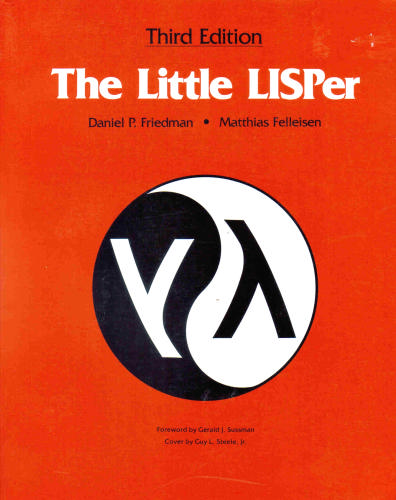The Little Pickaxer

C’è un libro bello e divertente che insegna a programmare in Lisp, che si chiama “The Little LISPer.” Per divertimento, proviamo a risolvere un esercizio da quel libro; ma da Rubyisti che siamo, lo facciamo in Ruby :-)
L’esercizio originale, a pag. 98:
What is
(rember* a l), where a iscup, and l is((coffee= cup ((tea) cup) (and (hick)) cup)?Risposta:
((coffee) ((tea)) (and (hick)))
Questa rember* in pratica rimuove tutte le occorrenze del primo simbolo, in una lista comunque innestata. Una prima approssimazione potrebbe essere
def rember_star(a, l)
l.reject {|x| x == a}
end
Infatti con questa passiamo questi test:
assert_equal [], rember_star(:anything, []) assert_equal [], rember_star(:foo, [:foo]) assert_equal [:bar], rember_star(:foo, [:bar]) assert_equal [:a, :c], rember_star(:b, [:a, :b, :c])
Ma fallisce miseramente con questo:
assert_equal [[[]]], rember_star(:foo, [[[:foo]]]) <[[[]]]> expected but was <[[[:foo]]]>.
perché reject non prevede di esaminare ricorsivamente gli array innestati. E poi la soluzione che vogliamo è una funzione definita ricorsivamente! Il punto è di rispolverare il vecchio muscolo della programmazione funzionale. Allora una prima versione, equivalente alla versione con reject:
def rember_star(a, l)
if l.empty?
[]
elsif l.first == a
rember_star(a, l.rest)
else
[l.first] + rember_star(a, l.rest)
end
end
Nota: Ruby supporta Array#first ma, inspiegabilmente, non supporta Array#rest. Per fortuna Ruby è estendibile:
class Array
def rest
self[1..-1]
end
end
assert_equal [], [1].rest
assert_equal [2, 3, 4], [1, 2, 3, 4].rest
Ora, per risolvere pienamente l’esercizio, quello che resta è ricorrere non solo sulla coda della lista ma anche sulla testa:
def rember_star(a, l)
if l.is_a? Symbol
l
elsif l.empty?
[]
elsif l.first == a
rember_star(a, l.rest)
else
[rember_star(a, l.first)] + rember_star(a, l.rest)
end
end
Di conseguenza dobbiamo aggiungere una “domanda” all’inizio: altrimenti ci ritroviamo a eseguire :foo.empty?, che produce un errore. Se la “lista” è stata montata fino a diventare un simbolo, restituiamo il simbolo. In questo modo riusciamo a passare anche il caso di test iniziale:
assert_equal [[:coffee], [[:tea]], [:and, [:hick]]],
rember_star(:cup, [[:coffee], :cup, [[:tea], :cup], [:and, [:hick]], :cup])
La programmazione funzionale è divertente! Ecco un problemino ulteriore (sempre da The Little LISPer):
What is
(insertR* new old l), where new isroast, old ischuck, and l is
((how much (wood)) could ((a (wood) chuck)) (((chuck))) (if (a) ((wood chuck))) could chuck wood)
Risposta:
((how much (wood)) could ((a (wood) chuck roast)) (((chuck roast))) (if (a) ((wood chuck roast))) could chuck roast wood).
Riesci a scrivere insertR* in Ruby? O nel tuo linguaggio preferito?
Aggiornamento: aggiunta immagine copertina
October 21st, 2007 at 13:15
“Questa rember* in pratica rimuove tutte le occorrenze del primo simbolo, in una lista comunque innestata.”
Innestata? Non sapevo che le liste fossero piante ;)
Questa � come tradurre “I pretend to have a horse in my factory” come “Pretendo di avere un orso nella mia fattoria”.
;))))
October 21st, 2007 at 14:57
rember_star(A, [A|Rest]) -> rember_star(A,Rest);
rember_star(A, [First|Rest]) -> [rember_star(A,First)] ++ rember_star(A,Rest);
rember_star(_, A) -> A.
rember_star_test_() -> [
?_assertMatch ([], rember_star(anything, [])),
?_assertMatch ([], rember_star(foo, [foo])),
?_assertMatch ([bar], rember_star(foo, [bar])),
?_assertMatch ([a, c], rember_star(b, [a, b, c])),
?_assertMatch ([[[]]], rember_star(foo, [[[foo]]])),
?_assertMatch ([[coffee], [[tea]], [e, [hick]]], rember_star(cup, [[coffee], cup, [[tea], cup], [e, [hick]], cup]))
].
insertR_star(A, B, [A|Rest]) -> [A,B] ++ insertR_star(A,B,Rest);
insertR_star(A, B, [First|Rest]) -> [insertR_star(A,B,First)] ++ insertR_star(A,B,Rest);
insertR_star(_, _, A) -> A.
insertR_star_test_() -> [
?_assertMatch ([], insertR_star(anything, anything, [])),
?_assertMatch ([foo,chuck], insertR_star(foo, chuck, [foo])),
?_assertMatch ([bar], insertR_star(foo, anything, [bar])),
?_assertMatch ([a,b,chuck,c], insertR_star(b, chuck, [a, b, c])),
?_assertMatch ([[[foo, chuck]]], insertR_star(foo, chuck, [[[foo]]])),
?_assertMatch (
[[how, much, [wood]], could, [[a, [wood], chuck, roast]], [[[chuck, roast]]], [se, [a], [[wood, chuck, roast]]], could, chuck, roast, wood]
, insertR_star(chuck,roast,
[[how, much, [wood]], could, [[a, [wood], chuck]], [[[chuck]]], [se, [a], [[wood, chuck]]], could, chuck, wood]
))].
October 21st, 2007 at 16:04
[…] Quindi la rember* non � altro che la reject applicata ad alberi (ovvero liste comunque innestate. S� Ugo, alla fine queste liste sono piante :-). […]
March 10th, 2008 at 11:28
[…] So far I’m in love with it. All the niceties of ROR without the dark arts part. Of course if you are able to read and enjoy The little LISPer you probably are much more intelligent than me. […]